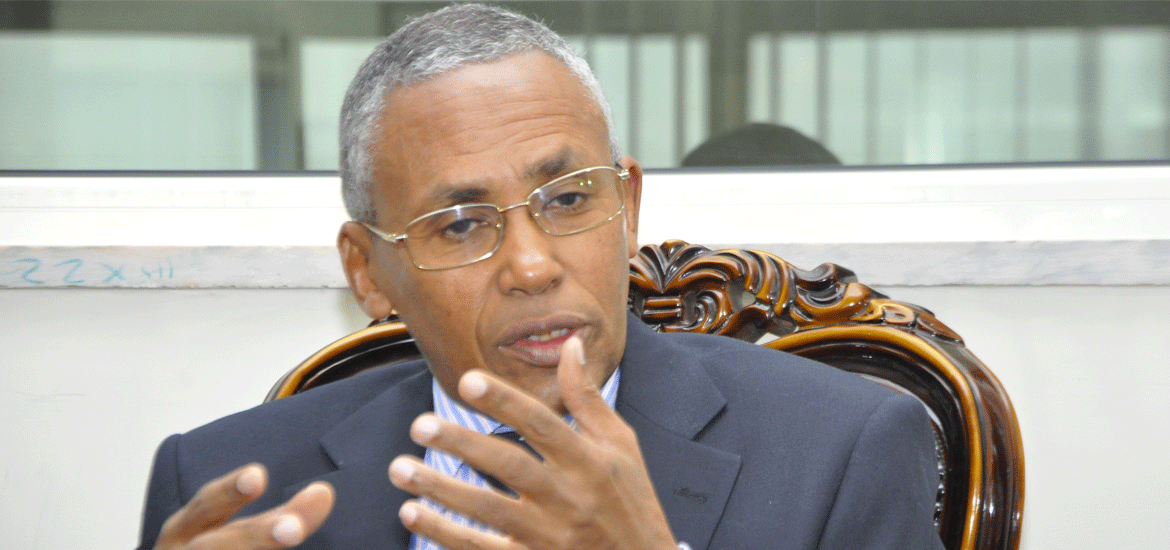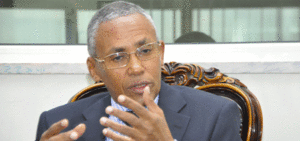Saad Ali Shire (PhD) was appointed as Minister of Foreign Affairs and International Cooperation of Somaliland in October 2015. Prior to his appointment he was the Minister of National Planning and Development for five years from 2012 to 2015. During his tenure as minister of national planning, he served in many committees including the National Planning Commission, the Somaliland Development Fund Joint Steering Committee, Somaliland Business Fund Grant Advisory Panel, Civil Service Reform Committee, Public Finance Reform Committee, Budget Policy Committee, Private Sector Reform Committee, Land Policy Reform Committee, Berbera Port/Corridor Development Committee. Prior to joining the public sector, Shire was the Managing Director of UK and Europe Dahabshiil Transfer Services Limited, a money transfer service company. Before that, he held senior positions in the community development sector, lectured at the college of Agriculture of Somali National University and worked for the UN Food and Agricultural Organization (FAO) and the World Bank. Shire is an economist and an agronomist. He studied agriculture at both Havana University, Cuba, and Somali National University where he earned his bachelor’s degree. He subsequently went to Pennsylvania State University in the US, where he did his master’s and PhD degrees in Agricultural Economics. He also has a post graduate diploma in Islamic Banking, and is an IMC member of the Chartered Financial Analysts (CFA) Society of UK. On the 27th anniversary of Somaliland’s reclaimed independence from Somalia, Birhanu Fikade of The Reporter sat down with Shire for a brief interview in Hargeisa. Excerpts:
The Reporter: On Somaliland’s 27th year Independence Day celebrations, what are the milestones that you can say were achieved since reclaiming your autonomy?
Saad Ali Shire (PhD): It feels great to celebrate the 27th anniversary of Somaliland’s independence from Somalia. By the way, Somalia and Somaliland were two different sovereign countries [even before the British and Italians]. Somaliland was under the British protectorate while Somalia was under the Italian trusteeship. In 1960, at the time when there were a lot of anti-colonial sentiment and movements across Africa, the dream of bringing the Somali inhabited regions in the Horn of Africa together was born. By the time, we wanted to unite the French Somaliland, now Djibouti, the Ogaden Region in Ethiopia and part of the North Distance Frontier (NFD) in Kenya. In that emotion, we rushed into realizing a unity with Somalia. Unfortunately, right from the start, the union didn’t work as expected.
So was it a voluntary union?
Yes, it was a voluntary unity. We had our people votes on the matter and drafted a union constitution in 1961. The process was organized by then young military officers of Somaliland. But, it was not successful either; and hence a movement or a process of reclaiming our independence was started. Early in the 1980s, there was a resistance movement to liberate Somaliland from the tyranny of the Siad Barre and his regime. That went on for ten years, from 1981 to 1991, during which time Somaliland has faced great destructions. The capital Hargeisa was destroyed and leveled to the ground. So since 1991, we have been rebuilding; and everything you could see in Hargeisa today is an outcome of this reconstruction. Over the years, we were not only able to rebuild the physical assets of our country but also developed our social services. For instance, in 1991, there were no schools in Somaliland but today we have 1000 schools across the country. We hardly have any clinic 27 years ago, but today we have health posts almost in every district. We also have 10 universities at moment but we didn’t have one at that time. Every year, we have close to 6000 students graduating from universities. I think we came a long way since 1991 and it feels great to celebrate our independence day with such outcomes.
Apart from democracy, stability and peace what most people talk about in Somaliland is international recognition. But why did the international community fail to recognize your country for 27 years?
I think we have historical, legal, political and humanitarian rights to be recognized. Somaliland is not the first country that dissolved a union. Many African countries have done it before. For instance, Senegal and Gambia were together at one point. The Fresh Sudan and Senegal were in union before. You have Ethiopia and Eretria, Egypt and Syria, the Sudan and South Sudan were also together as one country. There are so many examples that we could cite which dissolved their unities voluntarily. It’s nothing new what Somaliland is trying to do. We have fulfilled all the conditions of a sovereign state; we fit all the criteria. But, it is a valid question to ask why the international community is not recognizing Somaliland. That is in fact a question for the international community. I think there are two reasons for not recognizing us as a nation. One is fear and the other one is ignorance. When we say fear, I think there are a lot people who fear that this process might create what they call a Pandora’s Box. It is a fear that other countries in the region or beyond might emulate and this might lead to more countries spliting. I think that has been proven not to be the case. The AU Commission which came to Somalia in 2005, said in its reports that the case of Somaliland is unique and that “there is nothing like it”. Hence, there is no reason to fear that this will create a Pandora’s Box. There is no country with the same history as ours. The other reason that hindered our recognition is ignorance to the situation we are in and our historical background. Many people try to mix-up Somaliland and Somalia. They just think that Somaliland is a relegated region that wants to secede from a country: Somalia. That is not the case.
Is it because Somalia is claiming Somaliland to be part of its territory? Are they saying that?
At any rate, it is a misleading claim because we were two nations that had voluntarily joined and now trying to voluntarily dissolve the union on equal settings. There is no reason they should claim that. The people of Somaliland have made up their minds. They have said enough is enough. We don’t want to be part of Somalia because we had suffered a lot. Hence, why do we want to tolerate and prolong our suffering anymore when we can have our own independence?
It is feared that your bid to be recognized as an independent nation might be at stake following the recent Berbera Port development project to which the UAE and Ethiopia are stakeholders. We have heard objections from Somalia. They called for the annulment of the port agreement. What is the reaction of your government to that position? Is that going to put Somaliland in a more precarious situation?
I think, this claim is wrong in two ways. Back in 2014, at a meeting held in Djibouti, between then Presidents of Somaliland and Somalia, the two nations has agreed not to politicize development projects in the two countries. The port development project is a development project. It’s also wrong because Somalia has no business in Somaliland; just as we have no business running in Somalia. We are two different separate countries. By the way, this is not the first economic accord that the two nations have signed. We have signed many business deals in the past. We have entered into treaties. We have agreed and signed Memorandum of Understandings (MoUs) with many countries and companies before. There’s really nothing new. They have never made a fuse about agreements we made with any other country before. We understand why they are making such claims regarding the deal we have sealed with Ethiopia and the UAE. We believe they are making such claims because of Ethiopia. They might not be comfortable with the inclusion of Ethiopia in the project. That is the same reason why Somaliland wants to be recognized because it is the guarantor of peace. We don’t want to go back to the crisis we had in 1964 or in 1977. The government of Somalia might still be clinging to the idea of creating the Greater Somalia. So, we say, the only guarantor of peace and stability in the region is the recognition of Somaliland.
Was there any discussion among Somaliland, Somalia, UAE and Ethiopia following the statements made by Somalia regarding the port development project?
The agreement among UAE, Ethiopia and Somaliland remains intact. It is not affected by the position taken by the government of Somalia. They can say whatever they wanted to say; but we remain committed and make progress on our agreement.
It is unlikely to remain at peace and stability for 27 years in a region that is hostile and fragile. But, you have done that; so how did you manage to be at peace when other neighbors aren’t?
The difference between Somaliland and Somalia begins with the routes we took soon after the collapse of the government of Somalia. We have taken two divergent routes. Our route started with reconciliation. We had a serious of seven meetings on reconciliation process. After we had the reconciliation we started building a transitional government which then transformed into a democratic state through inclusive democratic systems of governance which is in place today. We had demobilized the militias. I think these are the main differences between Somalia and Somaliland. They haven’t had any reconciliation yet. There are a lot of people who are aggrieved and they still feel that justice hasn’t been done there. They haven’t demobilized the militia. They don’t have an inclusive government yet. We have conducted six elections all monitored by the international community. We have been able to stage “free and fair elections” as observers have declared. But, Somalia didn’t have one like that. I think Somaliland is a product of the people of Somaliland. There are no foreign troops here. We don’t have AMISOM and the reconciliation process was successfully held without the interventions of foreign parties. The UN was not involved. It was in indigenous process. As a matter of fact, I think that has saved us. It is said that the UN has offered to help. But, the elders had refused to accept. They said once you have accepted some sort of help or money, then someone will start to dictate your destiny. Hence, to be free and do what you wish to do right, you don’t have to be bound by someone else’s favor. That’s the philosophy they have back then; and that is how it worked to build democracy in our country.
The Reporter







































